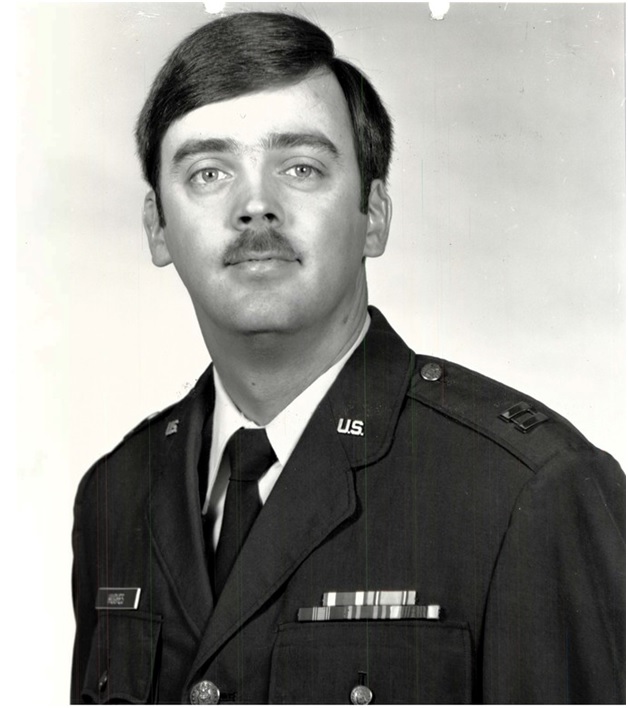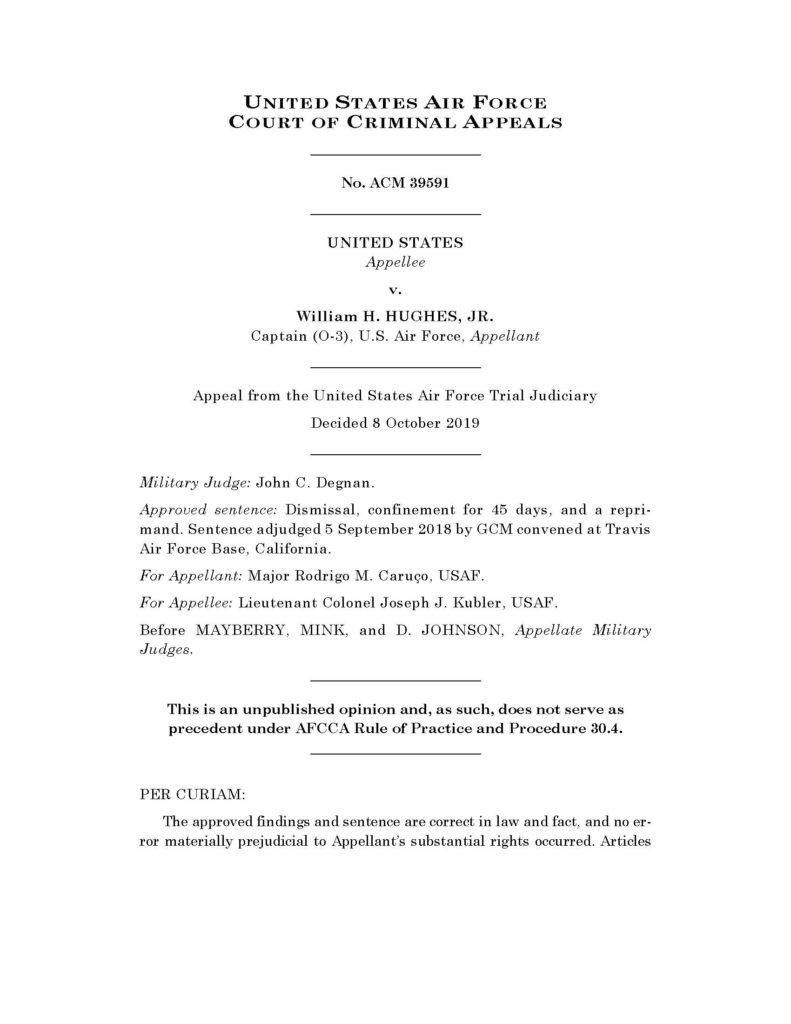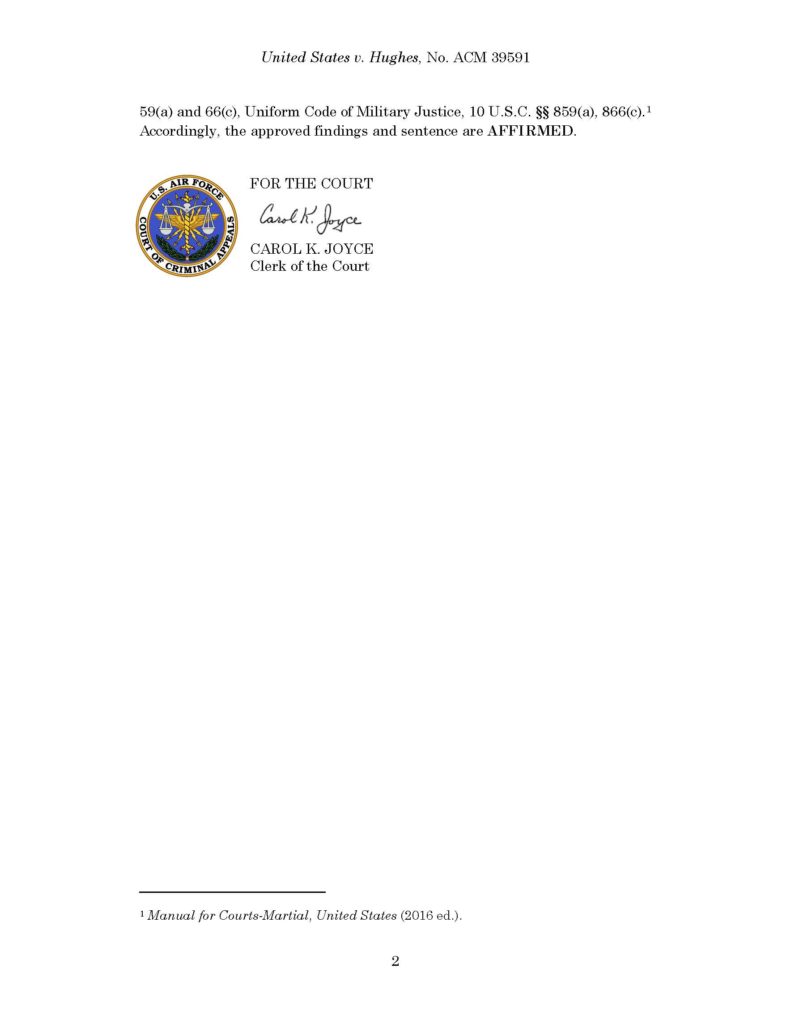
William H. Hughes, Jr., also known as Barry “Tim” O’Beirne deserted from the U.S. Air Force in 1983. He was found in 2018, arrested, tried by a general court martial, then convicted on September 5, 2018. He was dismissed from service and given a reprimand. He also spent 45 days in prison.
On October 8, 2019 the United States Air Force Court of Criminal Appeals upheld the conviction.
At the end of this post, I’ll ponder the severity of the sentence.
The disgraced former-officer, now-felon is William H. Hughes, Jr.
He had been hiding for 35 years under the assumed name of Barry “Tim” O’Beirne.
Previous post provides more detail on Deserter from the U.S. Air Force apprehended and tried.
Today the above post received a lot of visits from Reddit. Went there and found this discussion of the deserter.
One of the comments pointed me to the USAF appeals court.
There I found the appellate court ruling. Since it is an official government document, there are no copyright restrictions. Here is the appeal ruling in full:
Update 4/14/21: The appellate ruling 39591, which can be found here, is reposted:


You can go to the USAF Court of Criminal Appeals website for yourself. Click on the “Opinions/Orders” tab which will take you here. Enter 2019 in the “View opinions by year” box to find this page. Scroll down a ways to find the Hughes Jr case. Update: You can also search for docket #39591.
Is that conviction considered a felony?
I think the answer is yes.
This article says a conviction from a general court martial is usually a felony if the potential sentence is more than one year. Since the potential penalty for desertion is five years, this conviction qualifies.
This article says a conviction from summary court martial equivalent to a misdemeanor. Special court martial conviction would usually be considered a felony, while a general court martial conviction would almost always be a felony according to the attorney who writes the blog. The main exception would be if the charges were unique to the military, such as disrespect toward superior officer or failure to report.
Several other articles say the same thing.
I checked Public Data, an online site which can be used for background research. Neither of his names show up with a criminal record. I’ve read that for a number of years the military has not always done a good job of getting convictions into criminal data bases.
He is not listed in the Bureau of Prisons database, but I would not expect to see him there.
Punishment
There are five visible punishments and consequence for this disgraced former officer who deserted his post:
- Discharge from Air Force – The appeal order does not specify what level of discharge he earned. Specifically not mentioned is general or bad conduct. Noticed that on a few other rulings listed on the Court’s page. I do hope it was something below honorable. Doubt he cares about that.
- Reprimand – Seriously doubt he cares about that.
- Prison – 45 days – That is something he probably cares about. A month and a half in military prison is significant. Not quite in the ‘club fed’ category so it was rather unpleasant. A moderate, albeit low, penalty for a middle class person.
- Felony conviction – Articles above and my previous knowledge indicate he is now a convicted felony. That has some life-long consequence. In California it will cost you any professional licensing you may have. Lots of direct ripple effects from this. Lots more collateral consequences.
- Reputation – He is now a branded deserter who by his own admission deserted because he just didn’t feel like doing his duty. Public search on either of his names, William H. Hughes, Jr. or Barry “Tim” O’Beirne, will produce lots of links, which will last for decades.
Not a particularly strong set of punishments, but I suppose reasonable for what he did, although I and most of my colleagues from my days on active duty would have preferred something involving rusty razor blades and, well, um, never mind. A brand on his forehead or chest was obviously out of the question since that is an Army thing and has been out of use for a long time.
I guess forty-five days in prison and a felony conviction will have to suffice. (Update 4/14/21: Not that my opinion counts for anything.)
I seem to recall a “dismissal” for a commissioned officer is the equivalent to a dishonorable discharge… could be wrong though.
Hi Mark:
I don’t remember hearing that, but I was on active duty, um, a while ago. My guess is the fine print of the type of dismissal is what counts. Thanks for taking time to read and comment.
Jim
I am the proud mother of a USAFAcademy graduate, now serving as a Major at a DC-area post. This “man” (a stretch for me to use that term) makes me sick to my stomach! What a sleazy, irresponsible, cowardly thing to do. AAGGHH! If you can’t handle a job or just flat don’t like it anymore, MAN UP & resign like most decent human beings do. And to hide from your family for 35 years? There are much stronger words to describe him as a person, but best left unsaid here. The ruling & sentence seemed paltry to me, yet, could more realistically be done? His poor family. Good Riddance for the USAF! Thank you for your excellent article, research & primary document. PS: GO FALCONS!
Hi Becky:
Thanks for taking the time to comment.
The range of betrayal involved is wide. His family were left wondering and grieving for decades. His friends were bewildered, with a long OSI interview and likely additional background screening on them. Those of us who served honorably during the Cold War were betrayed. All who are serving now and all who have served since are mocked and betrayed.
All of us who endured the silliness and craziness of active duty and put up with random foolishness and unwise commanders are quite offended by his actions. We served. We endured. We did our share.
Thanks for reading.
Jim
Jim,
This story is fascinating to me. Could he have seen something through his work for the Air Force that really bent his aerial? From the statements of his family and considering his rank and level of responsibility, he seemed to be a decent, careful, intelligent and logical man. He had, I believe, 13 years of Air Force service in 1983. Captain Hughes would not have been assigned as he was without exemplary evaluations by his commanders. As reported, after deserting, he was a productive member of society. He worked at respectable jobs and seemed to do them well. Hughes was not charged with treason and it seems he never betrayed his country. It seems to me that possibly Hughes saw something that made him believe that he wouldn’t be allowed to resign, something that he needed to protect his family from. He may have even felt that his life was in danger. There is so much we will never know about this man. From what I read in the few very sketchy articles, I wish him well and I hope he has some friends.
Rich
Hi Rich:
Read an article, which I will discuss soon (hopefully) indicating he had 10 years of service at the time of his desertion. My recollection of being on active duty around that time suggests he probably didn’t have any commitments which would have preventing him from resigning. For example, served his initial commitment after commissioning, likely past additional obligation for a regular commission.
The few articles visible about him show he was working as an actuary and HR consultant for the University of California system. He was married in living in a home the couple owned. From those shreds of information, looks like he had done a good job of establishing an alternate identity and living a comfortable life.
You speculate he saw something terrible that led him to disappear or made him think his life was in danger. That is speculation but on the other hand there are no other options that make any more sense.
As far as seeing something that “bent his aerial”, that is something that happened to most of us at one time or another. If you hung out in SAC, you could see lots of things to bend your aerial. It is a massive jump from there to walking away and creating a new identity. But we don’t know what happened.
Thanks for taking the time to read and taking the time to comment.
Jim
So, I guess he wasn’t responsible for the Challenger and all of the satellite failures? I suppose all of those ‘experts’ and the ‘award winning reporter’ need to hang their heads in collective shame. The guy just walked away during peace time, he didn’t hurt anyone but his family-and that’s for them to work out.
Hi Joe:
Hanging their head in shame for being completely wrong? Not likely, Joe. From the NYT, especially? Not a chance.
I don’t understand the space launch stuff much deeper than looking at current developments of private space exploration in awe. However, I don’t get the link between working on destruct technology and C3 (per the NYT article) and multiple launches with different systemic failures. Not sure how working on comm capabilities could cause engine failures. Don’t have a clue how that could possibly tie in to 2 USAF launch failures, two Ariane failures, and the Challenger loss.
Disappearing during the Cold War, even though only having TS clearance, hurts the U.S. He betrayed a lot of people, especially his family. And then there is his wife. (Picture the discussion: “um, honey, I kinda’ sorta’ forgot to tell you I deserted from the Air Force…”)
The whole thing raises a host of questions, none of which have visible answers.
Thanks so much for taking the time to comment.
Jim